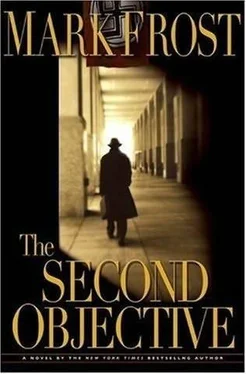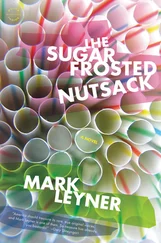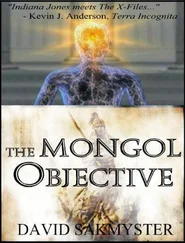“You bring them to justice,” said Bernie.
“We bring them here. What happens afterward is someone else’s department. Murder has and always will have a place in the human heart, but no proper person cares to see this, or think about what we do; they simply want it done. Bodies keep appearing, in different form, day after day, so there are no lasting victories. We go on, too, but the work brings a sadness of spirit.”
Grannit’s head was down, nodding slightly in agreement. Massou looked at them both, not without sympathy. He seemed to know something was off center between them, but chose not to pursue it, out of professional courtesy. He focused his warm, liquid eyes again on Bernie.
“This is your first time seeing such things,” he said.
“Yes, sir,” said Bernie, wondering what else this man knew about him from a glance. He felt there wasn’t much he’d be able to hide from him for long.
“The Romans had a phrase for it. If you need to catch a devil, set a devil on his trail.” He turned back to Grannit, reached forward, and handed him a card. “I will do what I can. Reach me at this number at any time, provided the phones are working. Where are you staying?”
“We hadn’t gotten around to that.”
Massou hurriedly wrote down an address on a pad. “This hotel is just around the corner. Very small, very discreet, an estimable kitchen. If you don’t mind my saying, Lieutenant, you both need a proper meal and some sleep.” He ripped off the page and handed it to Grannit. “I’ll call ahead.”
“Thank you,” he said.
“I’m certain you would do the same for me.”
Paris
DECEMBER 21, 10:30 A.M.
Walking from Montmartre toward the river, Von Leinsdorf turned a corner and found himself standing in front of the Paris Opera. He stopped to stare at the grand white wedding cake edifice, looked around the open square, and smiled at the thought of what he was about to do. He crossed the boulevard, sat down, and ordered a coffee at the Café de la Paix. His eyes scanned across the square and intersecting streets, picking out two undercover operatives in the crowded scene.
Looking for Lieutenant Miller, no doubt, he thought, amused.
When his coffee arrived, he offered a silent toast to Colonel Otto Skorzeny and absent members of the 150th Panzer Brigade. None of the men assigned to watch the square glanced his way. He knew he could have sat there all day without attracting any attention.
Von Leinsdorf wore a conservative overcoat, a dark business suit and hat, and he carried an ivory-headed cane. His hair had been tinted steel gray, and to his three-day beard, similarly bleached, he’d added a presentable white mustache. When he rose to leave, he dropped a few francs on the table, along with the morning edition of Le Monde, opened to a prearranged page. If anyone had thought to look at it, they’d have seen a few words hastily scrawled in French in one of the margins. It appeared to be a shopping list. He walked away with a pronounced limp, leaning on his cane. The veteran’s service medal he wore on his lapel, a bauble he’d picked up in a Montmartre thrift shop, dated to the Great War. When he rounded the next corner, he looked up and caught a glimpse of two American soldiers on the roof of an adjacent building, manning a machine gun, its barrel aimed down toward the café. One of the soldiers was stifling a yawn. Von Leinsdorf quietly tipped his hat to them and limped away.
He was astonished to see no signs of the impending Christ mas holiday enlivening the city’s broadest avenues. None of those elegant, swan-necked women in the shopping arcades or haughty restaurants. He had spent Christmas here twice before, once as a London schoolboy with his family and two years ago with the SS, who used trips to Paris as morale-boosting rewards, a tourist attraction for overachievers. The city always wore its brightest colors at Christmas. Now it appeared drab gray and drained of life. Walking through the Place Vendôme, he glanced up at the statue of Napoleon atop its stark central column, fashioned from melted Prussian cannon captured at Austerlitz.
The French beat us that time, Von Leinsdorf remembered grudgingly. Well, that was once.
Turning right onto the Rue de Rivoli, he settled on a bench at the edge of the Tuileries, directly across from the entrance to the Hotel Meurice. A line of Allied flags rippled in formation, a harsh wind stirring up a dark, scudding sky. Dozens of military vehicles for ranking British and American officers were parked out front, flying pennants, jutting into the avenue. When Von Leinsdorf had last been here, the hotel served as the German Army’s headquarters, until the surrender of the city. An artillery shell had since collapsed two of the arches-covered with scaffolding, under repair-that spanned its classical nineteenth-century facade.
He remembered climbing those same steps for the first time, proud and in awe, his father’s sleek leather glove holding his hand. His father was still a high-ranking diplomat and they had been treated like royalty, shown all the sights, squired around the city in a chauffeured car. The happiest days his family had ever known, less than a year before they ended in a single day.
Twelve years later, after the Germans had taken France, he returned as an SS officer on leave, self-made, on his own merits. Everyone in that hotel, in Paris, showed him a respect that not so long before he’d had reason to believe would be denied to him forever. With that visit had come the assurance that his father’s disgrace was at last behind him.
The sound of the chair hitting the floor in the next room.
The old man’s obsequious, servile smile, the fluttering of his hands whenever a superior turned a corner. How pathetic and defeated he had looked when they found him out. The image still sickened Von Leinsdorf. The womanly tears as his father confessed the secret he’d kept from his wife and son all those years; everything they believed about him a lie. Packing his own bags for exile, unshaven, doubled over, sobbing as he folded every collar and crease like a ghetto tailor, the life already kicked out of him. The shameful legacy of the Jew visible in him from a mile away.
Von Leinsdorf had vowed to forget the man. He would cut the scar from his soul.
The creak of the rope when he walked in and found him swinging from that beam. The old man’s pleading eyes meeting his, clawing at his own throat, his life ending with one last misgiving. Von Leinsdorf never moved. He watched him die and then he turned and left the room.
No one had ever worked harder to erase a memory; why would it come back now? Because Paris had fallen? Did that mean all his work had been for nothing? This hotel, the site of the only triumph he’d ever known, was back in the hands of the enemy, Americans and British crawling all over the city, smug and entitled, as if the war were already won.
They would soon be hearing from him about that.
The rattle of a passing bus broke his reverie. He studied the hotel, noting the security outside, the traffic patterns passing through its doors. After twenty minutes he crossed the street and climbed the stairs, leaning on his cane.
Stammering in excited French and broken English, he explained to the guards at the door that an unexploded German shell had been found in his neighborhood. They tried to explain that he needed to report such a matter to his local police or SHAEF’s offices near the Place Vendôme. With the wounded dignity of an outraged Great War veteran, his tirade resulted in a spell of breathlessness. The guards assisted him into the lobby to recover, promising he could speak to the next available officer. After bringing him a glass of water, they promptly forgot about him. Von Leinsdorf settled into a chair that offered him a view of the elevators and the front desk. He watched a steady stream of British officers who had taken up residence in the hotel as they came and went.
Читать дальше












